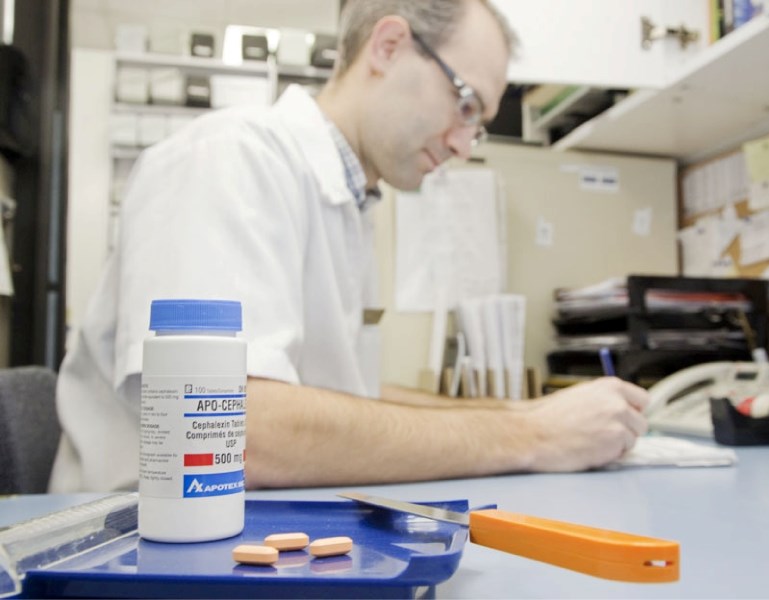A shortage of a number of commonly used prescription drugs is being felt across the country, including here in St. Albert where one pharmacist says the scarcity of certain drugs is frustrating to both pharmacists and patients.
Ryan Diprose, a pharmacist at the Grandin Medical Clinic, said drug shortages are nothing new but in recent years he’s seen more shortages of commonly used drugs like penicillin.
“There’s always been shortages but sometimes they’re oddball medications. But in this case, there are more common ones that we’ve never had shortages of in recent history,” Diprose said.
Last fall, the Canadian Pharmacists Association surveyed its members about the extent of drug shortages across Canada.
Outside of Ontario and Quebec, 89 per cent of respondents had trouble locating medication to fill a prescription during their last shift and 87 per cent said drug shortages had greatly increased over the last year.
Pharmacists in Canada were most often short of Amitriptyline, Cephalexin and Metroclopramide in 2010, according to the report.
Diprose said his pharmacy has experienced shortages of all three of those drugs, as well as many others including an antidepressant called Elevil and Fluconazole, which is used to treat yeast infections.
He said drug company representatives will sometimes let him know in advance when a drug is going to be unavailable so he can stock up or when a drug will be available again.
“They try to do that. Sometimes it’s accurate, sometimes it’s not,” he said.
While some prescriptions can easily be substituted with other drugs, others cannot.
“Antibiotics are your biggest problem because you’re limited in your choices sometimes.” Diprose said.
If there is a shortage of a particular drug, he said pharmacists can phone doctors to suggest an alternative or ask patients to try filling their prescription at a different pharmacy.
“That’s all you can say. Most patients are understanding that there is nothing we can do. We do everything we can to get it in,” Diprose said.
He said some pharmacies, including his, can also purchase raw materials and make capsules and liquids in-house.
If a drug is desperately needed, Diprose said pharmacists can also contact both the Alberta College of Pharmacists and the Pharmacists Association of Alberta, who can then send emails to all the pharmacies in Alberta in an effort to locate the drug.
However, when a three-month shortage of penicillin occurred two years ago, Diprose said there was little anybody could do.
“No one had any. It was pointless to tell people to go to other pharmacies.”
While he’s heard many theories regarding drug shortages in Canada, including regulatory and manufacturing changes, no one has given him a straight answer.
“No one has really come out and said what the problem is, that’s the frustrating part,” Diprose said, adding it takes additional manpower to locate scarce supplies or find alternatives.
“It’s frustrating because it takes people out of their regular medication and then it takes a lot more time and energy to make changes, to find other options,” he said.
Steve Long, executive director of Pharmaceutical Funding & Guidance for Alberta Health and Wellness said the reasons for Canada’s recent drug shortages are threefold.
“Manufacturers are going through a change in standards as to how they go about producing products and that change in standards I think has taken them longer than anticipated and therefore they’re not getting batches and lots of their products approved as time goes on,” said Long.
He said the pharmaceutical industry is also rationing itself internationally and as a result, fewer people are producing raw materials than in the past and the supply chain is more vulnerable to disruption.
While some chemicals for prescription drugs are produced in Canada, Long said many come from India, China and Israel.
“I think it’s becoming more competitive,” he noted.
“We don’t have six producers of a single molecule anymore. We’ve got one or two producers for penicillin for instance and if that company has a problem, it goes through the whole system because they become sole supplier,” Long said.
While the manufacturing of pharmaceuticals is a federal issue, Long said if the province is aware of a shortage, pharmacists can substitute brand products for a generic brand.
In addition, he said Alberta Health and Wellness will add other products to their drug benefit list as substitutes for the missing product.
Top 10 drug shortages 2010 in Canada
1. Amitriptyline
2. Cephalexin
3. Metoclopramide
4. Amoxicillin + Clavulanate
5. Diltiazem
6. Triazolam
7. Clonidine
8. Methotrimeprazine
9. Tetracycline
10. Penicillin



